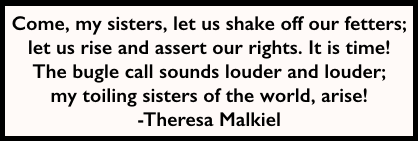 ———————-
———————-
Hellraisers Journal – Tuesday January 17, 1922
”The Castaway” -a Poem by Matilda Robbins
From The Industrial Pioneer of January 1922:
 ———————-
———————-
Hellraisers Journal – Tuesday January 17, 1922
”The Castaway” -a Poem by Matilda Robbins
From The Industrial Pioneer of January 1922:
 ———————-
———————-
Hellraisers Journal – Saturday December 30, 1911
Aberdeen, Washington – The Constitution as Upheld for Fellow Workers
From the Spokane Industrial Worker of December 28, 1911:
——-
WAKE UP GOVERNOR HAY.
—————Tacoma, Wash, Dec. 17, 1911.
Honorable Marion E. Hay,
Governor of the State of Washington,
Olympia, Wash.Sir:-
We, the undersigned, do hereby respectfully call your attention to the lawlessness which, as we are informed, now exists and for some time past existed in Aberdeen, Chehalis county, in this state.
We herewith enclose affidavits to show that workingmen who have been charged with no crime whatever have been compelled to leave said city by an irresponsible mob of brutal men armed with guns and cubs-a proceeding for which we are advised, there is no authority in law and which, we submit, is to a marked degree, against the peace and dignity of our state.
Our laws, as we are informed, provide that persons charged with a crime may be arrested and after being found guilty in the manner prescribed by law, may be punished. Such punishments, we are informed, may be fine, imprisonment, the infliction of death penalty upon the offender, and in certain cases the performance of an operation to prevent procreation.
There is no law providing that persons, guilty or innocent, desirable or undesirable may be run out or town.
Trusting that you may, in the exercise of your authority as chief executive of our state, see your way clear to suppress all lawlessness and assuring you of our ability and willingness to furnish much or evidence of the character herewith enclosed, we beg to remain, respectfully yours,
ED GILBERT.
A. J. AMOLSCH.
MANS BECKER.[Emphasis added.]
———-
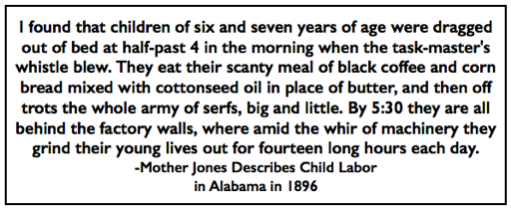 —————
—————
Hellraisers Journal – Friday December 13, 1901
“The Weavers” by Heinrich Heine, Translated by J. L. Joynes
From The Comrade of December 1901:
 ———————-
———————-
Hellraisers Journal – Thursday November 17, 1921
“The Miner” by Thomas McPherson of Sullivan, Illinois
From the United Mine Workers Journal of November 15, 1921:
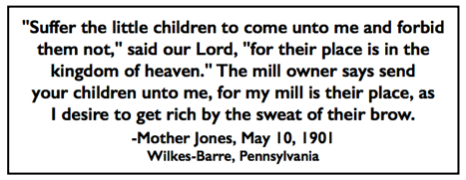 —————
—————
Hellraisers Journal – Saturday November 2, 1901
“Little girl with the form so haggard…” -a Poem by Hebe
From The Comrade of November 1901:
—–
[Drawing from page 48: “Civilization” by “N”]
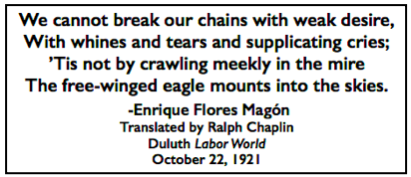 —————
—————
Hellraisers Journal – Sunday October 23, 1921
“To The Struggle” -a Poem by Enrique Flores Magón
From the Duluth Labor World of October 22, 1921:
 —————
—————
Hellraisers Journal – Sunday October 9, 1921
Two Sonnets by Claude McKay: “Baptism” & “The White City”
From The Liberator of October 1921:

—————
Hellraisers Journal – Wednesday August 24, 1921
Poem for those who laid the railroad track but not allowed to ride at all.
From the Industrial Pioneer of August 1921:
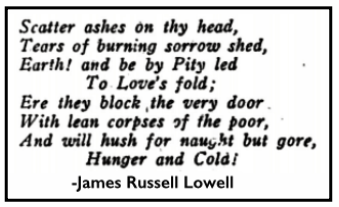 —————–
—————–
Hellraisers Journal – Monday July 24, 1911
“Hunger and Cold” -a Poem by James Russell Lowell
From The Coming Nation of July 22, 1911:
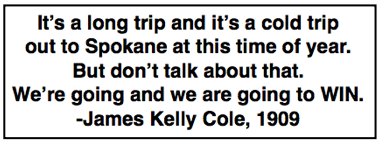 —————
—————
Hellraisers Journal – Friday June 23, 1911
Poems of James Kelly Cole, Martyr of Spokane Free Speech Fight
From the Spokane Industrial Worker of June 15, 1911:
THE LIFE WORK OF KELLY COLE
—————By Frank Bohn.
James Kelly Cole was killed in a railway accident at Tomah, Wisconsin, November 17th, 1909. He was on his way to take part in the Spokane free speech fight and was riding free.
At that time I wrote a short letter in the [New York Socialist] Call, drawing attention to the self-forgetfulness which led to the untimely death of this young comrade. To me he was simply one of many who were then fighting for freedom of speech in Spokane and elsewhere. I had not even learned his name. It is therefore a peculiar pleasure to discover that, dying in the cause, he left us something very much worth while. A little book of poems entitled “Revolutionary Writings” suggest to us the deep loss suffered by the movement when he went to his death.
His picture as well as his poems makes one regret not to have known him personally. He was a representative of a type-the type of idealistic young Americans of both sexes who are now thronging into the Socialist movement. He was fortunate in having had educational advantages. He had been a student at one of the Chicago High schools and abundant leisure during his youth afforded him opportunity for wide reading on a variety of subjects.
The most significant feature about his personality and his work was the revolutionary spirit. His intense hatred for misrule coupled with his desire for emancipation from wage slavery once led him into a tactical error. He was forced to spend more than a year in the federal prison at Leavenworth, Kansas.